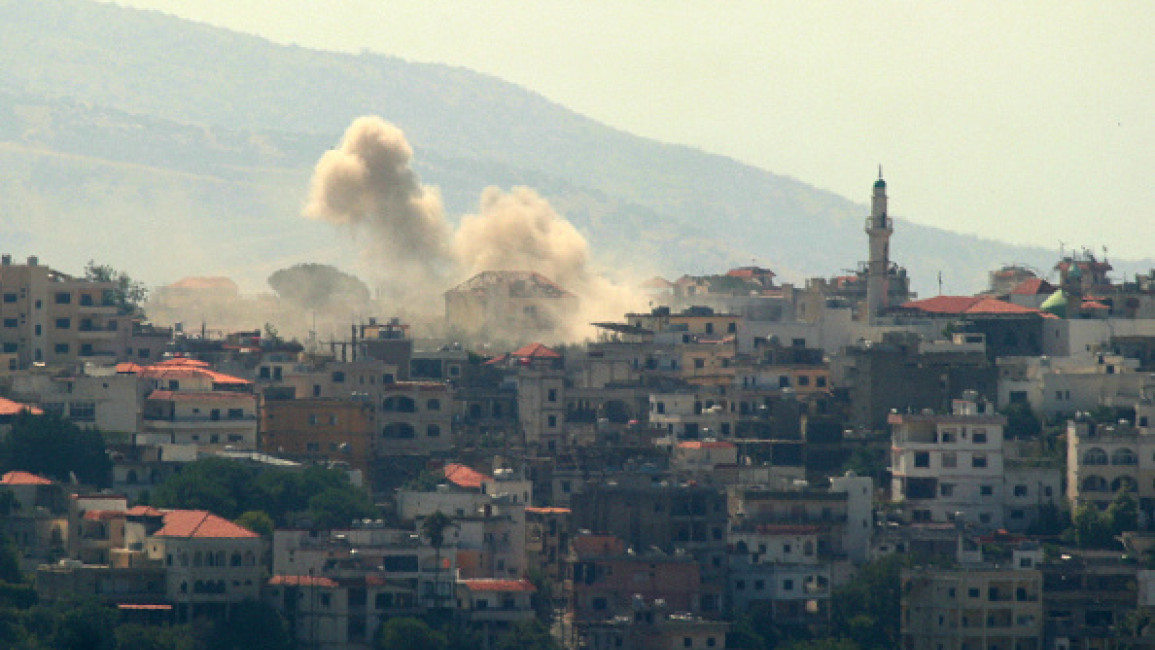
In Lebanon's south, Syrian refugees grapple with the impact of Hezbollah and Israel's war

Residing in south Lebanon’s Bint Jbeil, Syrian labourer Issam and his wife and three daughters have found themselves caught in the middle of cross-border fire between Israel and Hezbollah.
Unable to relocate to Beirut or other cities due to the high rental costs, and with difficulty in accessing healthcare, life is increasingly precarious for the Syrian family.
“My daughters have shortness of breath because they inhaled the white phosphorus, and I can’t afford to take them to a nearby private hospital,” Issam tells The New Arab.
Syrian refugees injured in Israeli attacks in south Lebanon are generally unable to afford the medical fees for consultations and hospital treatment in nearby private hospitals.
According to the last Cumulative Emergency Report published by the Lebanese Ministry of Public Health on 20 August, seven percent of those injured in Israeli strikes since the beginning of the war are non-Lebanese citizens, with 42 percent of total injuries attributed to blunt trauma and 15 percent due to chemical exposure to white phosphorus.
At least 31 Syrians have been killed since the start of the clashes between Israel and Hezbollah in southern Lebanon, including two women and eight children, while 18 others have been injured, according to a report by the Syrian Observatory for Human Rights in August.
Mahmoud* is a young Syrian gardener living in Nabatieh. He narrowly escaped serious injury in Israeli airstrikes that killed members of the Berjaoui family in February this year.
“I was close to the strike, and I survived just by luck. Had I been injured, I would have had to bear the cost at my own expense,” he told The New Arab.
Lebanon’s Minister of Health, Firas Abiad, told TNA that health coverage for Syrian refugees’ war-related injuries is outside of the ministry’s mandate and budget. The ministry has requested that hospitals and the Office of the United Nations High Commissioner for Refugees (UNHCR) expand their emergency health coverage for displaced Syrians and those still residing in conflict areas in the south.
UNHCR told TNA that they provide health coverage for injuries sustained by Syrian refugees but that their services are subject to the availability of funds.
In November last year, UNHCR announced a reduction in the number of its beneficiaries after it only received funds to cover 36 percent of its budget.
As of June 2024, their funding stands at 15 percent, forcing a “prioritisation and reprioritisation” of services, the UNHCR spokesperson told TNA.
Even with the limited availability of medical coverage, most Syrian refugees face significant challenges in accessing these services. Some live far from UNHCR-contracted hospitals and cannot afford the trip.
|
|
This is the case for Ahmad* who lives in Bint Jbeil next to a non-UNHCR hospital. “The amount I will pay for a medical consultation here is equal to what I would pay on transportation if I go to Sour where there is a UNHCR hospital,” he told TNA.
Syrians also face challenges in accessing information about medical coverage and services. Many are either not aware of changes in service provision or policies published online or do not know about the types of coverage that differ between conflict and non-conflict areas.
According to the UNHCR’s website, refugees in need of emergency healthcare and who are recognised by the UNHCR can go to the nearest UNHCR-contracted hospital with a valid ID document and UNHCR certificate.
If they require hospitalisation, they must pay $100 to be admitted and 40% of the total bill. Information about health coverage for injuries sustained by Syrian refugees from Israeli attacks is not appropriately disseminated among the Syrian refugee communities residing in conflict areas in the South.
Many of them report that the UNHCR no longer covers healthcare fees.
“Syrian refugees are covered up to a certain amount by the UNHCR depending on their case,” Sleiman Haroun, the president of the Syndicate of private hospitals in Lebanon, told TNA.
And while private hospitals abide by the health ministry’s regulations of providing emergency healthcare for injured Syrians, the cost remains high. “One of the consequences of this is that some injured Syrians return to Syria to receive treatment there,” Haroun tells TNA.
Another challenge to access is mobility. Southern Lebanon is currently lacking basic services, making it difficult for Syrian refugees to use transportation due to the high cost and lack of fuel and water in the area. Syrians also endure mobility restrictions for fear of deportation and questioning by Hezbollah, with some accused of spying for Israel.
Syrian refugees are therefore left to depend on their personal networks to navigate the challenges of accessing healthcare as the conflict between Israel and Hezbollah grinds on, Lebanon’s Access Centre for Human Rights told TNA, with many having to go without.
Such obstacles further compromise the safety of Syrian refugees in impacted areas who cannot relocate due to financial constraints or because they are prohibited from renting in other safer villages.
“Injured Syrians face significant financial, bureaucratic, and residency-related obstacles to receiving medical treatment, and the racist rhetoric propagated by politicians and media outlets have worsened their conditions, with the goal of forcing them to repatriate,” ACHR told TNA.
* Names have been changed
Nour Nahhas is an independent writer and researcher based in Beirut
Follow her on X: @nournahhas_







 Follow the Middle East's top stories in English at The New Arab on Google News
Follow the Middle East's top stories in English at The New Arab on Google News


